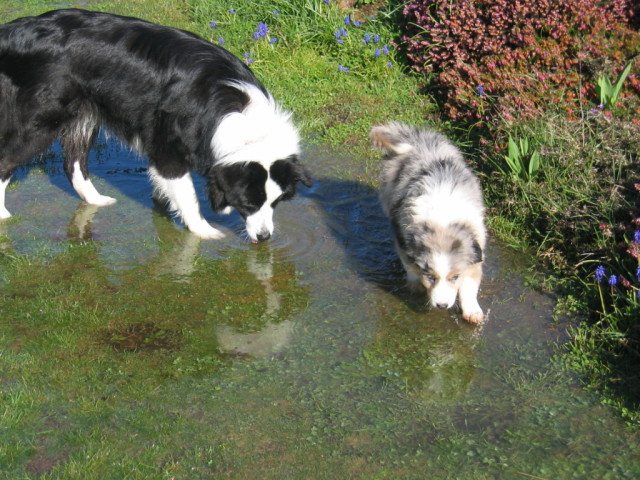QuestionJust curious of the temperament of this mix. My son found the puppy at 6 weeks old. She is now 10 weeks. She is somewhat calm but can get mouthy at times. Just curious of what her mix will be...
AnswerIt's impossible to determine the true "mix" of even a first generation; many mixed breeds appear "shepherd" and many more have Doberman or Rottweiler (very similar) markings.
Mouthiness is normal in any puppy. The best way to stop it is to yelp in pain and quickly move away from the pup for a few seconds, EVERY TIME. This communicates to the pup (as would its litter mates) that teeth HURT and removal of yourself is actually a punisher. Most pups respond quickly once they get the idea. Do not offer a toy as a substitute, that's a reward. Simply yelp and move away quickly, then return; repeat as often as necessary.
Ten weeks is a neonate. This is a baby who is as much an empty slate as any other: 50% nature, 50% nurture. If she's calm, that's a huge plus. Take advantage of that by keeping her calm, which means no harsh words, NO punishment for house training accidents or stealing things, etc., and only positive reinforcement training. The mixed breed is actually a wonderful companion. A multiple generation mix has lost most of the genetic faults of its purebred forefathers and longevity is higher. Positive reinforcement training, with very very brief sessions of no more than 5 minutes at a time until the dog matures a few more weeks (judge her attention span and correct your training accordingly) is key. You can learn about it by going to karen Pryor's web site on clicker training or reading Patricia McConnell Ph.D. book on the subject.
Socialization of this pup is essential. She must meet/greet as many people, animals, and see as many places as possible for short intervals every day (or at least three times a week.) Begin with sparsely populated areas and work your way up. Beware of anything that might provoke an instant fear response, such as someone else's dog on leash unless you've ascertained that this is a friendly dog, and keep the introduction short being aware of any rough housing from the older dog. Young children are especially to be watched; do not allow any young child to manhandle, tease, or otherwise subject the puppy to any fearful interaction. The pup should meet children of every age but your close supervision is necessary. As she gets older, she will gain confidence out in public and begin to greet the world at large with joy. The friendlier she is toward everyone, the better. A well adjusted dog will offer an appropriate response to any serious threat to YOU without training, and the shepherd/rottie/doberman mix is especially keen in this department. A friendly, well adjusted dog makes a wonderful lifelong companion and an attentive pack member.
Watch the veterinarian closely. Do not subject the puppy to any veterinary attention that isn't soft, loving and observant of the pup's response. Fear in veterinary clinics is ubiquitous in dogs and this is sometimes the result of careless management by the veterinarian. Your veterinarian needs to be educated in dog behavior at least to the point where s/he is willing to give a bit more time to "woo" clients and pay attention to any fear related behavior if it begins to develop.

 Agressive 1 yr old mini goldendoodle
Question
our millie
My husband and I got our min
Agressive 1 yr old mini goldendoodle
Question
our millie
My husband and I got our min
 agressive silky terrier
Question
Lucas 1 year old
Hi Jennifer:
I have a
agressive silky terrier
Question
Lucas 1 year old
Hi Jennifer:
I have a
 Black lab - 1 yr
QuestionSheba
QUESTION: My lab loves to bite her
Black lab - 1 yr
QuestionSheba
QUESTION: My lab loves to bite her
 Dog light and shadow chasing
Question
Jenni
My 3 year old Cavalier King Charles Span
Dog light and shadow chasing
Question
Jenni
My 3 year old Cavalier King Charles Span
 Dog in Heat?
QuestionLily and Jorge
QUESTION: Hello,
We have
Dog in Heat?
QuestionLily and Jorge
QUESTION: Hello,
We have